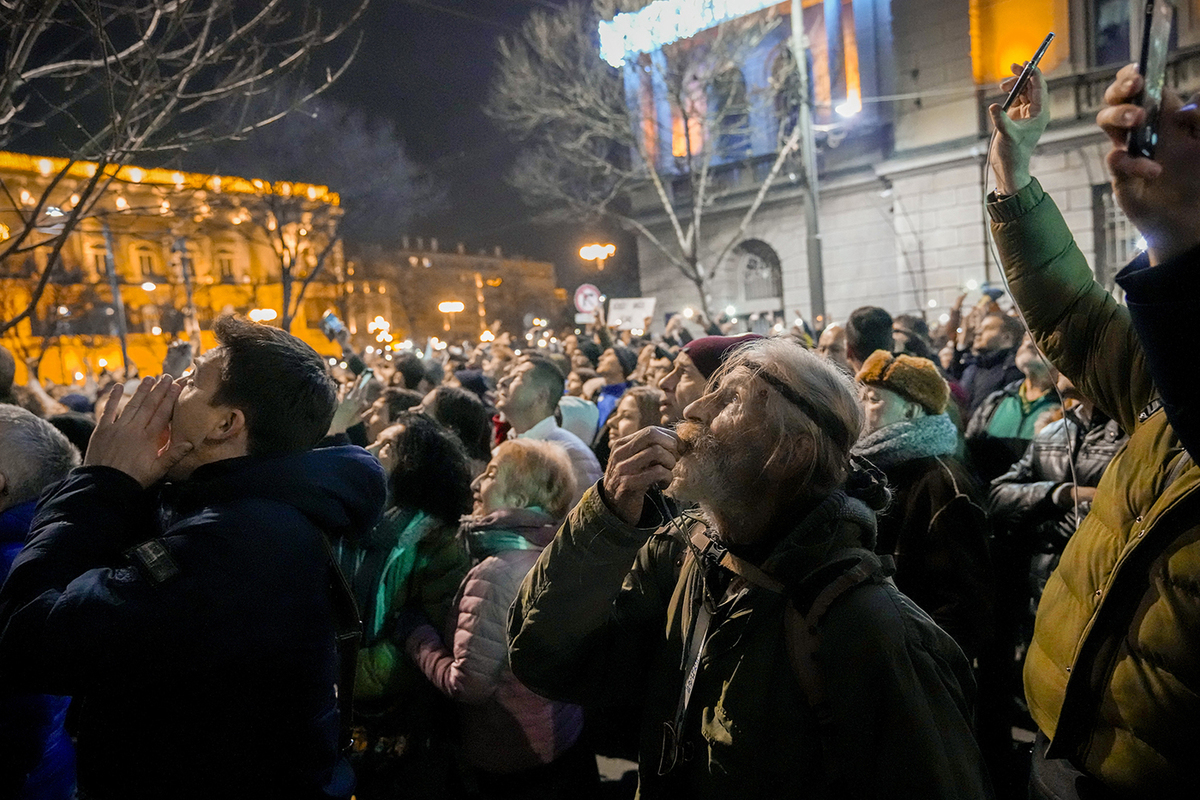Serbia took to the streets, but is not ready for a “color revolution”
[ad_1]

After the early parliamentary elections in Serbia, relations between the current government and the opposition did not improve. Seeing that Aleksandar Vučić’s coalition narrowly beat the opposition list “Serbia against violence” in the municipal elections in Belgrade, the pro-Western bloc immediately announced some kind of falsification of the results. All this resulted in evening protests by opposition supporters, where eggs and toilet paper were used. We analyze how the anger of the Serbian street could turn out.
Belgrade is burning again. The opposition, which had previously expressed only verbal dissatisfaction with the results of the past municipal elections, decided to take action. Ironically, the coalition with the sonorous and promising name “Serbia against violence” essentially resorted to violence.
Having gathered at an incredibly quickly put together protest rally in front of the building of the Republican Election Commission, demonstrators began to demolish fences, tried to enter the REC building, and threw eggs, tomatoes and toilet paper at the windows and walls. The intensity was such that a fight broke out between opposition supporters.
One of the most brutal episodes happened to the director of the Republican Institute of Statistics, Miladin Kovacevic, who reported an attack on him. During a broadcast on TV channel N1, Miladin said: “I was going home because it was already late, and in the morning I have to go back to work. But they attacked me like animals and knocked me down. 15-20 people attacked me, I fell. Perhaps he damaged his spine.”
A little later, as the Serbian newspaper Politika writes, the Chairman of the Republican Election Commission, Vladimir Dimitrievich, said at a meeting of the REC that their colleague had suffered a head injury. By the way, as Pink writes, those involved in the attack were promptly detained and sent to serve their sentences for 48 hours.
Photos of a bag seized from activists were circulated in the Serbian media. Knives and bats were found in it.
The opposition puts forward one main demand – to cancel the results of the elections in Belgrade, where the difference in the number of mandates between “Serbia Cannot Stop” and “Serbia Against Violence” was very close, and to hold new municipal elections.
Why they are shaking the RIC is not entirely clear. According to its chairman, the city electoral commission, not the REC, is responsible for city elections in Belgrade. The Republican Commission simply does not have such powers. Opposition leaders even decided to go on a hunger strike. All this does not quite resemble the “democratic methods of combating injustice” promised by Miroslav Aleksic.
Many began to compare the situation in Serbia with the well-known events in Ukraine. These are the Orange Revolution of 2004 and the Maidan of 2014. However, Serbia itself had its own similar example: the overthrow of Slobodan Milosevic (“Bulldozer Revolution”) in 2000. The claims against Milosevic are similar to the claims against Vucic now, including regarding the unproven election fraud.
What now? Will the current government of Serbia be able to calm the violent heads or the scenario of the greatest escalation, alas, is inevitable.
“Protest activity in Serbia has been constantly on the agenda in recent years,” explains Polina Sokolova, a researcher at the Department of European Political Studies at the IMEMO RAS. – Probably, many have already forgotten, but after the presidential elections, the opposition held rallies of thousands every week, new opposition activity swept the country after the mass shootings in May of this year. This is due to both the domestic political situation (which is complicated by the Kosovo issue) and the international situation.
Such routine opposition activity can result in a serious unprovoked or planned near-revolutionary situation. But at the same time, keeping a sound head, we can say that support for the authorities in Serbia is significant.
The political scientist draws attention to the favorable economic situation in the country and the success of Serbia’s foreign policy maneuvering between Russia and the West. The opposition, in response, the expert notes, shifts all the blame to the authorities. They say that by not introducing sanctions against Russia, the establishment allegedly supports the culture of violence in Serbia itself.
– Perhaps the situation will develop in an unfavorable direction. But in my opinion, this is an unlikely scenario. But it’s difficult to predict, says Polina Sokolova.
– There is an opinion, based on the international situation and the obvious pressure from the West on Vucic, that certain forces from outside may be involved in inciting the protests. How permissible and true is such an idea?
– Of course, the opposition has obvious support from Western politicians. We have also heard statements from the German Foreign Minister Annalena Bärbock, who says that “we need to fight the nationalist propaganda of the ruling elite.” The West sees in the Serbian government those who, in their opinion, do not provide an opportunity to normalize the situation in Kosovo. All the blame is placed on Serbian politicians.
The opposition, I repeat, has Western support, but so far only in words. But, of course, the country’s non-governmental organizations receive American and European assistance.
The expert notes that when comparing the current situation with the situation during the time of Milosevic, one must understand that modern Serbia is stable. As a historical fact, this must be remembered. However, it does not 100% coincide with the realities of today.
[ad_2]
Source link








